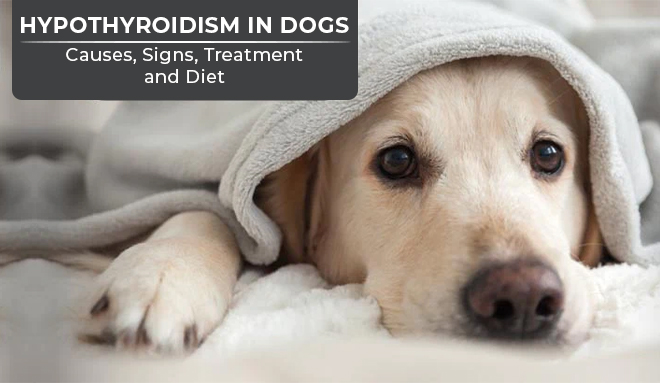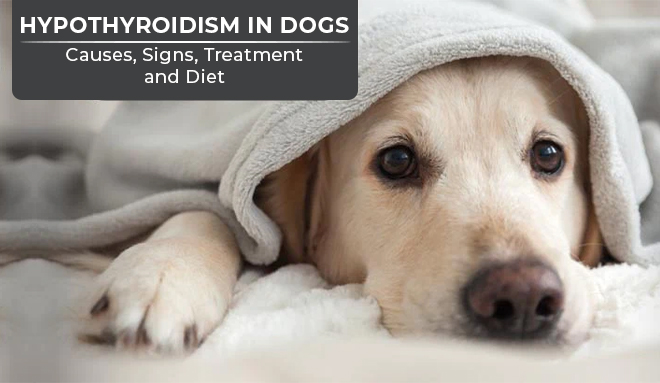
Hypothyroidism in dogs occurs when the thyroid gland, which is made up of 2 separate lobes lying at both sides of the windpipe or trachea, doesn’t produce and secrete enough thyroid hormones. Hypothyroidism is prominent in middle-aged to older dogs. It is a hormone imbalance in dogs caused by the inflammation or contraction of the thyroid gland.
Causes of Hypothyroidism
Hypothyroidism in dogs is caused by either lymphocytic thyroiditis or idiopathic thyroid gland atrophy. Among these, lymphocytic thyroiditis is the most common cause of hypothyroidism and mostly is an immune-mediated disorder that damages the canine thyroid gland. On the other hand, idiopathic thyroid gland atrophy occurs when fat accumulates in regions of thyroid tissues.
Several studies claim that the causes of hypothyroidism in dogs can be either external or internal.
These factors can be-
- Raw food diet
- Choke collars
- Medications and vaccines
- Excessive inbreeding
- Antibacterial agents in pet products like soaps, etc.
- Environmental toxins
The majority of these claims are based on the idea that each of the above factors has a unique impact on the thyroid and endocrine system. Nevertheless, further research must be conducted before any definitive findings can be made.
Signs of Hypothyroidism
Hypothyroid symptoms in dogs vary. The disease causes the metabolic rate of the body to slow down, virtually affecting every organ in the dog’s body. Thus dogs with hypothyroidism show multiple signs and symptoms.
Here are a few of them:
- Hair loss or excessive shedding
- Skin issues and infections
- Ear infection
- Weight gain
- Fatigue
- Laziness
- Anemia
- Inability to tolerate cold
- Dull and dry hair coat
If a dog displays any of these signs, a further examination by the veterinarian must be done. Since there are other disorders that mimic the symptoms of hypothyroidism, a definitive diagnosis can only be given after a series of diagnostic testing.
Treatment for Hypothyroidism in Dogs
Unfortunately, there is no cure for hypothyroidism in dogs, but it can be treated. Synthetic thyroid hormone replacement therapy is the clinical method of treating hypothyroidism to compensate for reduced thyroid function.
Depending on the severity of hypothyroidism in dogs and their response to the treatment, different dosages are given once or twice daily. The symptoms should start to alleviate after the treatment has begun for the affected canine. With regular treatment, the majority of dogs can eventually return to enjoying a normal, healthy life.
Hypothyroidism in Dogs: Which diet is the best?
Hypothyroidism can affect overall canine health and thus it is necessary to provide a balanced diet for dogs, in addition to a hormone replacement treatment. A balanced diet includes all the nutrients and vitamins that are essential for a dog’s well-being.
Here are a few ingredients that are necessary for a balanced diet and aid in treating hypothyroidism in dogs:
- Animal-based sources– Meat, fish, salmon oil, chicken fat, and poultry are animal-derived foods that support lean muscle mass, provide energy and address coat and skin issues in dogs with hypothyroidism.
- A Balanced Diet– It is necessary to provide meals rich in dietary fibre and carbohydrates to support digestion in dogs. Furthermore, nutrients like iodine, vitamin A, vitamin B, iron and folic acid can aid in supporting thyroid functions and overall canine health.
- Probiotics and prebiotic fibres– Supplements such as prebiotic fibres and probiotics aid in better digestion and nutrient absorption.
- Grain-free diets– Some dogs cannot tolerate whole grains in their meals. Thus choosing a dog food that is grain-free and does not contain genetically modified ingredients in the composition is important.
- No artificial additives– Artificial colours, flavours and preservatives may negatively impact the dog’s thyroid functions and thus should be avoided.
Best Food for Dogs with Hypothyroidism
Since every ingredient that a dog meal contains will impact the canine’s health, choosing a healthy diet plan is important. It is necessary to feed diets that contain animal-based protein, low fats, highly absorbable nutrients, probiotics, and grain-free ingredients, to improve their overall health.
Here is a list of the top healthy foods-
Hill’s Science Diet Adult Sensitive Stomach & Skin Chicken Dry Dog Food is gentle on the dog’s skin and stomach and ensures proper nutrient absorption in dogs with sensitive stomachs. It contains a blend of antioxidants- that support a healthy immune system, and gentle fibres for healthy bowel movements.
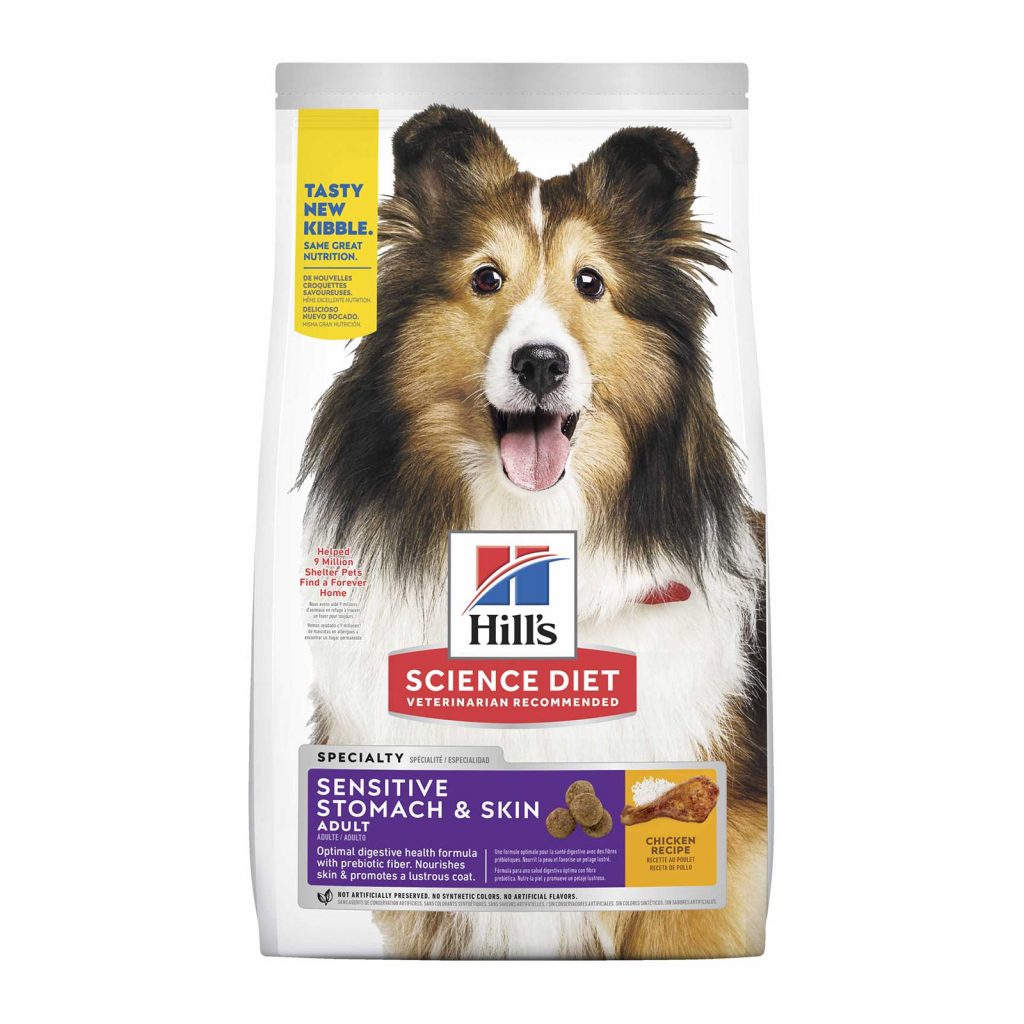
Pro Plan Adult Sensitive Skin Stomach Formula is specifically formulated for dogs with sensitive skin and stomachs. It contains real hydrolysed salmon and tuna that act as protein sources for dogs.
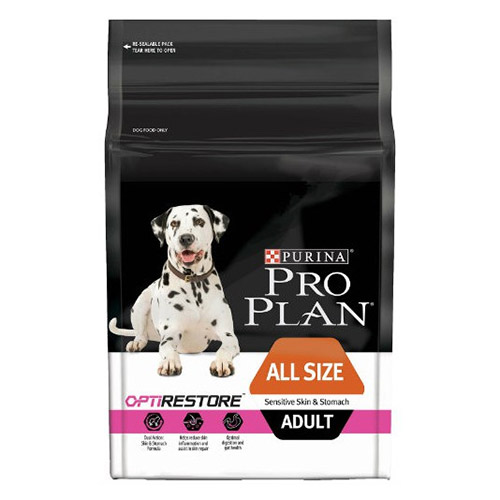
ADVANCE Sensitive Skin & Digestion All Breed – Salmon with Rice is a premium dry dog food, rich in omega-3 fatty acids and high-quality salmon that treat sensitive skin. Vitamin E further strengthens the immune system and prebiotics promote healthy digestion.
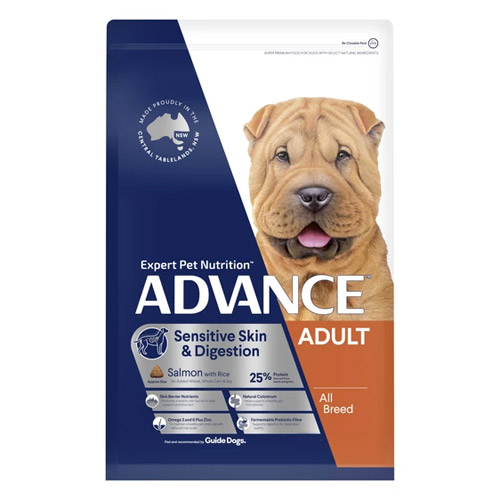
Concluding Note
Hypothyroidism in dogs is common and with a suitable treatment, it can easily be managed. It is recommended to seek professional advice before feeding any dry or canned food to the affected dog. With a healthy and balanced diet, appropriate care and recommended therapeutics, dogs diagnosed with hypothyroidism can live a long and happy life.

